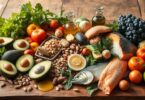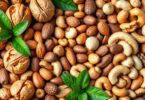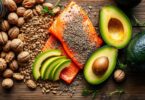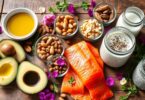I’ve always been interested in how dietary fats affect our health. Growing up, I was told to stay away from fats. But now, I see how important the right fats are for us.
They give us energy, help us absorb vitamins, and keep our hearts and brains healthy. Healthy fats are the real heroes of a good diet.
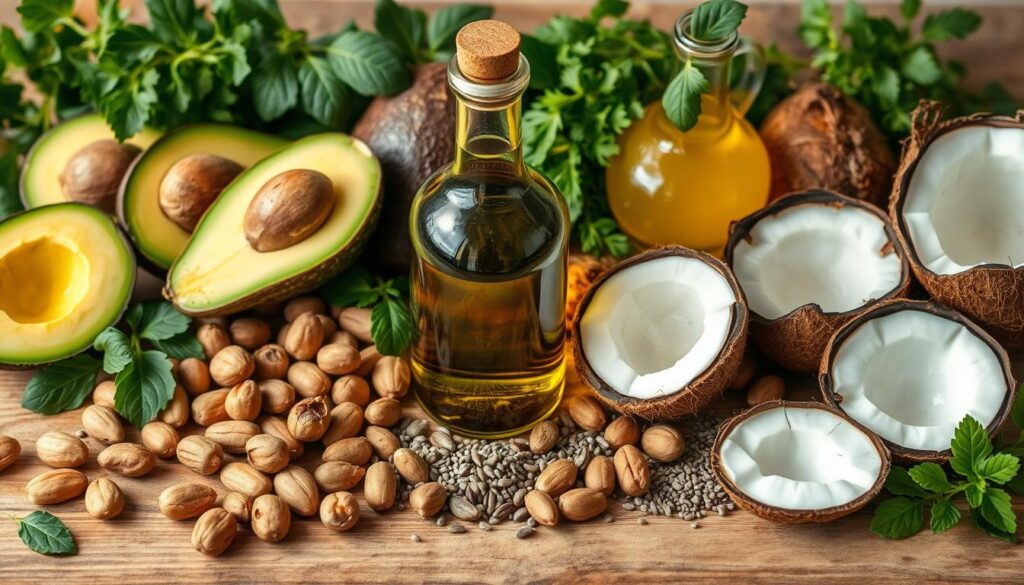
Key Takeaways
- Dietary fats are crucial for energy, vitamin absorption, and heart and brain health.
- Monounsaturated and polyunsaturated fats, including omega-3 and omega-6 fatty acids, are considered healthy fats.
- Healthy fat sources include fatty fish, olive oil, and chia seeds.
- Incorporating healthy fats in meals creates a feeling of fullness, slows carbohydrate digestion, and adds flavor.
- Healthy fats aid hormone function, memory, and nutrient absorption.
Understanding Dietary Fats and Their Role in Health
Dietary fats are key nutrients for our health. They give us 9 calories per gram. They help with energy, vitamin absorption, and protect our heart and brain.
But, not all fats are the same. It’s important to know the different types and how they affect our bodies.
Types of Dietary Fats Explained
There are four main types of dietary fats: saturated, trans, monounsaturated, and polyunsaturated. Saturated and trans fats are solid at room temperature. Monounsaturated and polyunsaturated fats are liquid.
How Fats Impact Body Functions
Healthy fats like monounsaturated and polyunsaturated fats are good for us. They lower heart disease risk and bad cholesterol. They also increase good cholesterol and fight inflammation.
On the other hand, eating too much saturated and trans fats is bad. It raises bad cholesterol and heart disease risk.
The Connection Between Fats and Cholesterol
Cholesterol is a fatty substance our body makes. It’s affected by the fats we eat. HDL is the “good” cholesterol that helps remove excess cholesterol.
High LDL cholesterol can clog arteries and raise heart disease risk. Switching to healthier fats is key for a balanced cholesterol level.
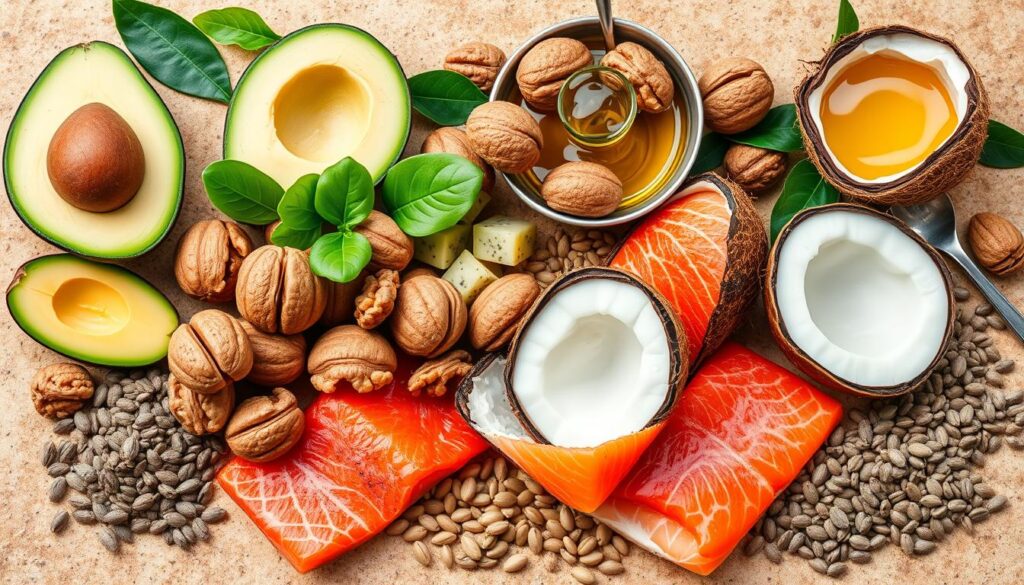
“Understanding the different types of dietary fats and their effects on health is the first step towards making informed choices for a healthier lifestyle.”
Good Fats vs. Bad Fats: Essential Differences
Dietary fats are not all the same. Knowing the difference between healthy fats and unhealthy fats is key for good health. Healthy fats, like monounsaturated and polyunsaturated fats, help your heart and keep cholesterol levels right.
Trans fats and too much saturated fats are the “bad guys.” They can cause weight gain, clogged arteries, and raise the risk of serious diseases. Trans fats are especially bad because they increase bad LDL cholesterol and lower good HDL cholesterol.
The U.S. Food and Drug Administration (FDA) banned artificial trans fats in foods. But, it’s still up to us to check food labels. Saturated fats are not as bad, but we should still eat them in small amounts.
| Good Fats | Bad Fats |
|---|---|
| Monounsaturated and polyunsaturated fats | Trans fats, excessive saturated fats |
| Improve heart health and cholesterol levels | Increase risk of heart disease, weight gain, and chronic illness |
| Found in foods like avocados, nuts, seeds, and olive oil | Found in heavily processed and fried foods |
Knowing the difference between healthy fats and unhealthy fats helps us make better food choices. This supports our health and well-being.
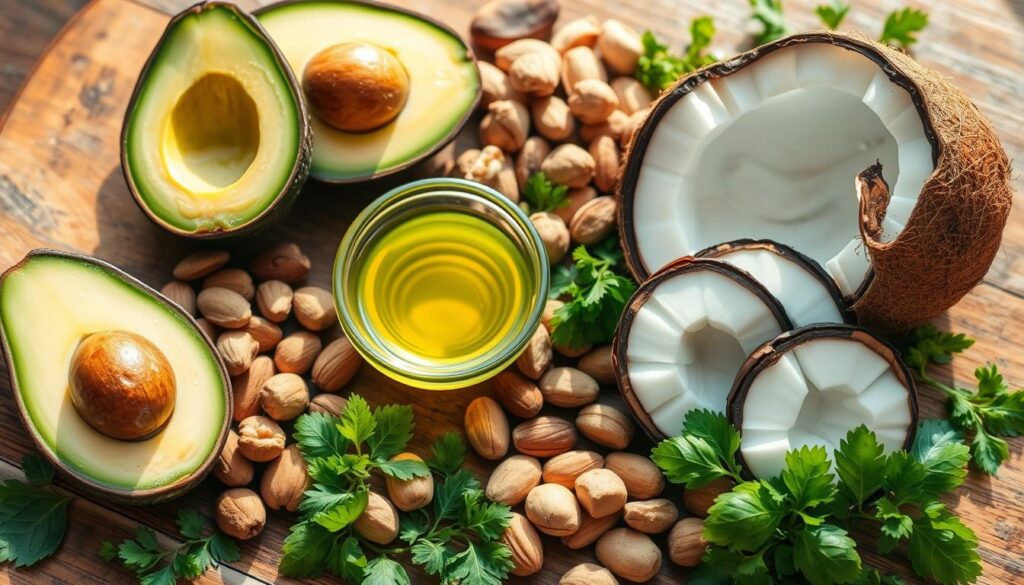
“The Dietary Guidelines suggest limiting saturated fats to less than 10 percent of calories per day.”
Fat-Rich Foods for Optimal Nutrition
Incorporating the right fats into your diet is key for optimal nutrition. There are many healthy fats from plants, animals, and dairy. These choices support your health and well-being.
Plant-Based Sources
Avocados, olives, nuts, and seeds are great for healthy fats. Olive oil and canola oil are full of good fats. Research shows olive oil can lower disease risks like heart disease and diabetes.
Animal-Based Sources
Fatty fish like salmon, mackerel, and sardines are rich in omega-3s. 8 ounces of fish a week is good for brain and heart health. Eggs also offer beneficial fats and protein.
Dairy Sources
Full-fat dairy like yogurt is full of healthy fats and probiotics. Cheese boosts butyric acid, helping with weight and metabolism. Adding these dairy fats to your diet can be tasty and nutritious.
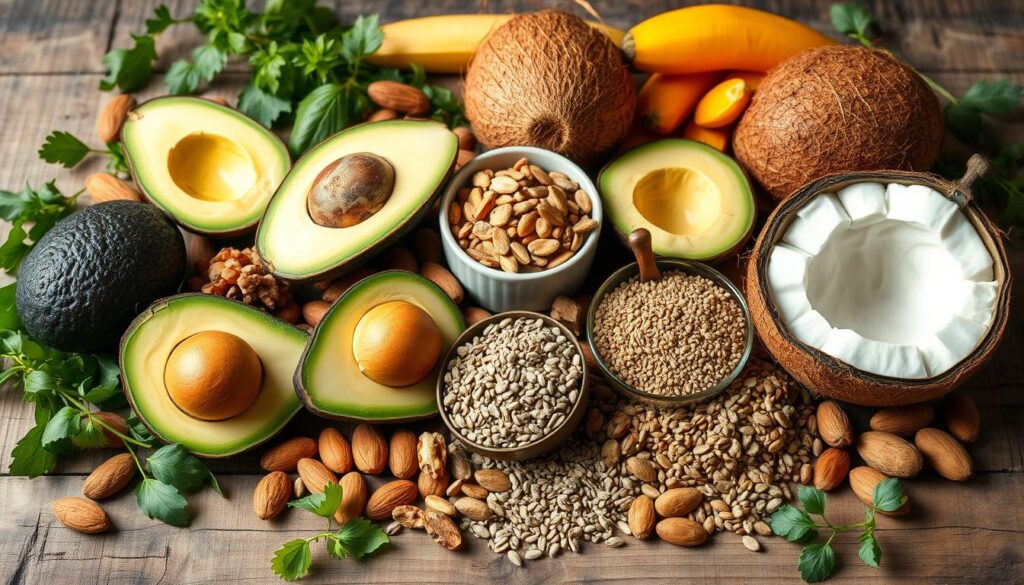
Avocados, olive oil, fatty fish, and full-fat dairy are all great for nutrition. Adding these to your diet can greatly benefit your health.
The Power of Omega-3 Fatty Acids
Omega-3 fatty acids are essential fats that are good for our health. EPA and DHA, found in oily fish and algae, are the most beneficial. ALA, in plants, is also valuable but less strong.
Many studies show omega-3s are amazing. They help with depression, ADHD, and bipolar disorder. They also protect against memory loss and heart disease. Plus, they ease arthritis and support healthy pregnancies.
The American Heart Association suggests eating fatty fish like salmon twice a week. If that’s hard, omega-3 supplements can help.
| Omega-3 Fatty Acid | Primary Sources | Key Benefits |
|---|---|---|
| EPA (Eicosapentaenoic Acid) | Oily fish, algae | Reduces inflammation, supports heart health |
| DHA (Docosahexaenoic Acid) | Oily fish, algae | Promotes brain and eye health, supports fetal development |
| ALA (Alpha-Linolenic Acid) | Plant-based sources (flaxseeds, walnuts, chia seeds) | Provides anti-inflammatory benefits, supports overall health |
Adding omega-3 fatty acids to your diet can greatly improve your health. You can get them from oily fish, plants, or supplements. Making sure you get enough omega-3 is a simple way to live healthier.
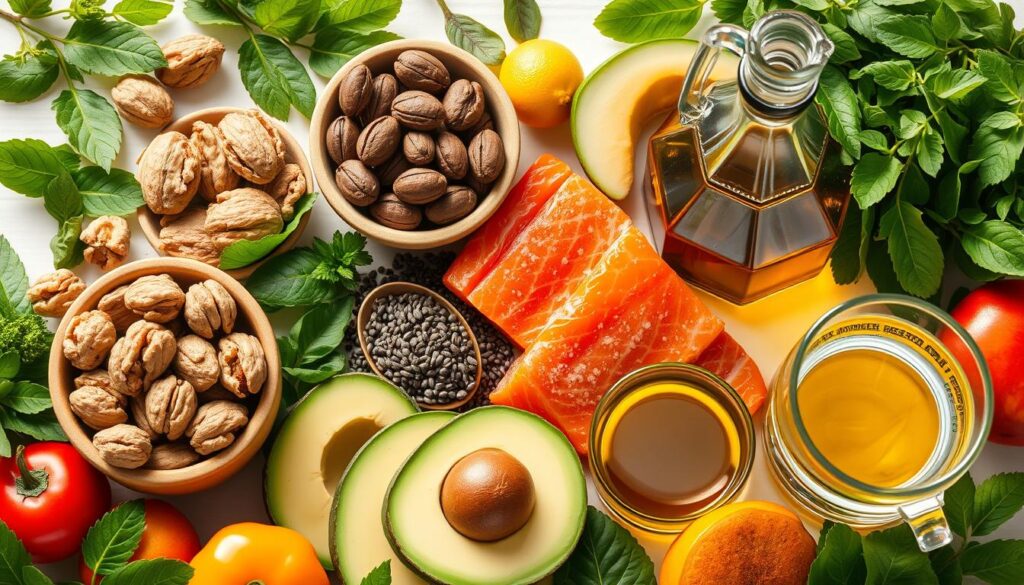
Monounsaturated Fats: Benefits and Sources
Monounsaturated fats are good for your heart. They help lower bad cholesterol and raise good cholesterol. This can lower your risk of heart disease and stroke.
Heart Health Benefits
Eating foods with monounsaturated fats is good for your heart. These fats can prevent heart problems and reduce inflammation. They also help your heart work better.
Switching to monounsaturated fats can help you burn fat and lose belly fat. This is especially true if you eat more carbs but less saturated fats.
Top Food Sources
Here are some foods rich in monounsaturated fats:
- Olive oil, a key part of the Mediterranean diet
- Avocados, which help control blood sugar in people with diabetes
- Nuts like almonds, peanuts, and hazelnuts
- Peanut butter and other nut butters
- Canola oil, peanut oil, and high-oleic safflower and sunflower oils
Eating these foods can help keep your heart healthy. It’s a simple way to improve your overall health.
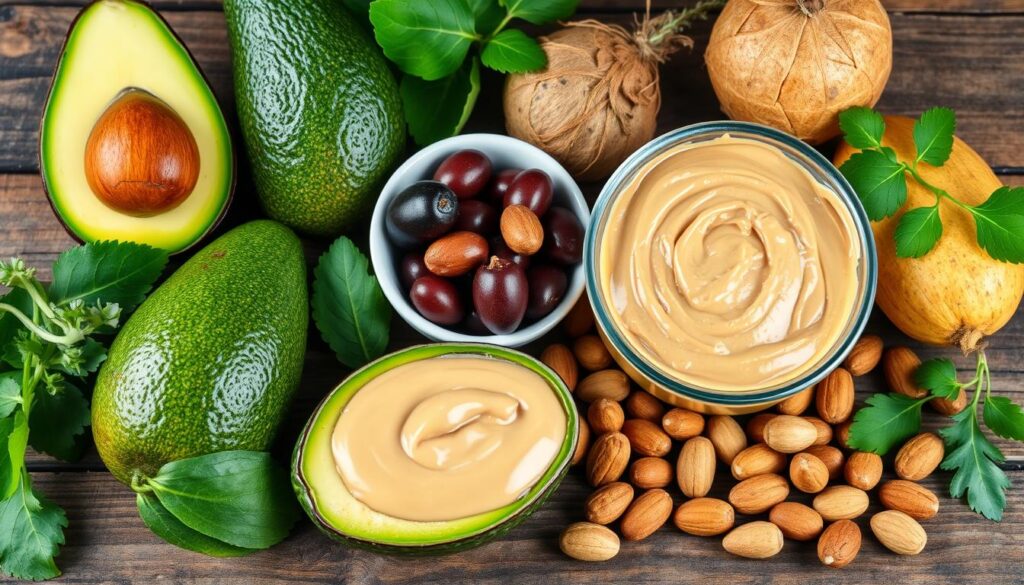
“A diet rich in monounsaturated fats may help control blood lipid levels and provide a protective effect against cancer.”
Remember, monounsaturated fats should be 25-30% of your daily calories. Saturated fats should be less than 10% of your total calories. Replacing saturated fats with monounsaturated or polyunsaturated fats is a smart choice for better health.
Polyunsaturated Fats in Your Diet
Polyunsaturated fats (PUFAs) are fats our bodies can’t make. They include omega-3 and omega-6 fatty acids. These fats are key for our health. You can find them in many healthy foods.
Good sources of PUFAs include:
- Sunflower, sesame, and pumpkin seeds
- Flaxseed
- Walnuts
- Fatty fish (salmon, tuna, mackerel, herring, trout, sardines)
- Soybean and safflower oil
- Soymilk and tofu
Eating these polyunsaturated fats can lower heart disease risk. They also help lower bad cholesterol. It’s key to balance omega-3 and omega-6 fatty acids for the best health.
“Polyunsaturated fats are essential for the proper functioning of the body and can offer numerous health advantages when consumed in moderation as part of a nutrient-rich diet.”
Choose wisely and add different PUFA sources to your meals. This way, you get the health perks of these fats. It helps keep you well.
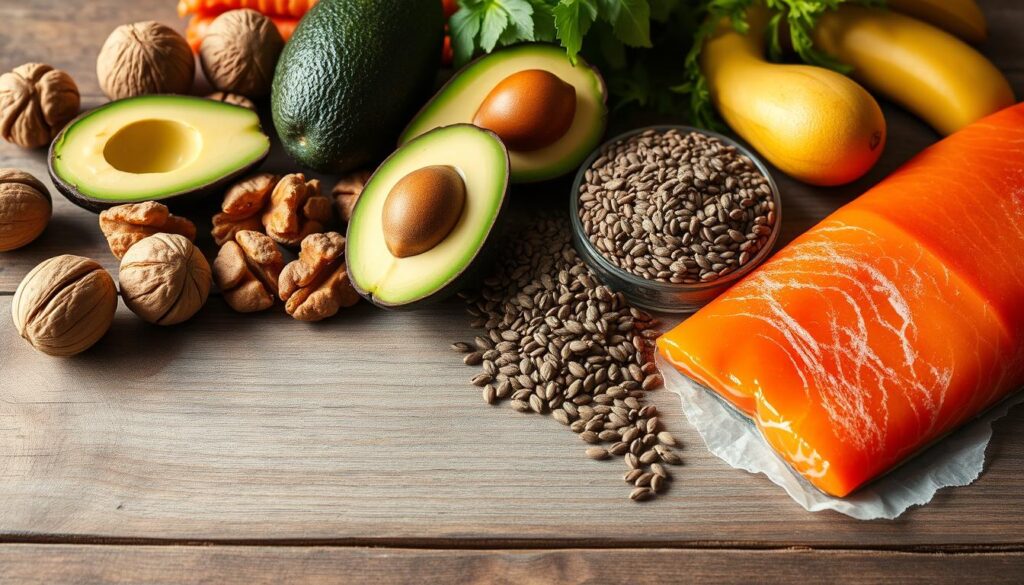
Essential Guide to Fatty Fish Consumption
Fatty fish are full of omega-3 fatty acids, which are good for us. They help our heart and brain. But, it’s key to know which fish are best and how much to eat.
Best Fish Varieties for Healthy Fats
Some fish are better than others for omega-3s. The best ones are:
- Salmon
- Mackerel
- Herring
- Lake trout
- Sardines
- Albacore tuna
These fatty fish have lots of omega-3 fish oils. They are great for a healthy diet.
Recommended Serving Sizes
The American Heart Association says to eat at least two 3.5-ounce (100-gram) servings of fatty fish a week. This helps your heart and brain.
But, watch out for mercury in fish. Big fish like shark and swordfish have more mercury. Most adults can safely eat up to 12 ounces of cooked seafood a week. Pregnant women, nursing moms, and young kids should eat less mercury.

“Eating fish is better for heart health than taking omega-3 supplements, as the benefits may not be as strong.”
Nuts and Seeds: Nature’s Fat-Rich Powerhouses
Nuts and seeds are full of healthy fats, protein, fiber, vitamins, minerals, and antioxidants. They are great for our health and well-being. They help lower heart disease and diabetes risks and support brain health.
Studies show nuts are good for us. A 5-year study with over 373,000 people found nuts help avoid weight gain. This is because they make us feel full and satisfied.
Each nut type has different fats but all are good for us. Almonds have 14.1 grams of fat per ounce. Brazil nuts have 19 grams, and walnuts have 18.5 grams. Chia seeds have 8.7 grams of omega-3s per ounce. Flaxseed is also rich in omega-3s and dietary fiber.
“Nuts are recommended as part of a healthy diet, ideally eaten around 4 to 6 servings of unsalted nuts a week for adults.”
Eating nuts and seeds has many benefits. They lower heart disease risk, improve artery health, and reduce inflammation. They also lower blood pressure and cholesterol levels. Plus, they help us live longer.
Choose unsalted or unsweetened nuts and seeds for the best health benefits. Adding them to meals and snacks is a simple way to nourish your body.
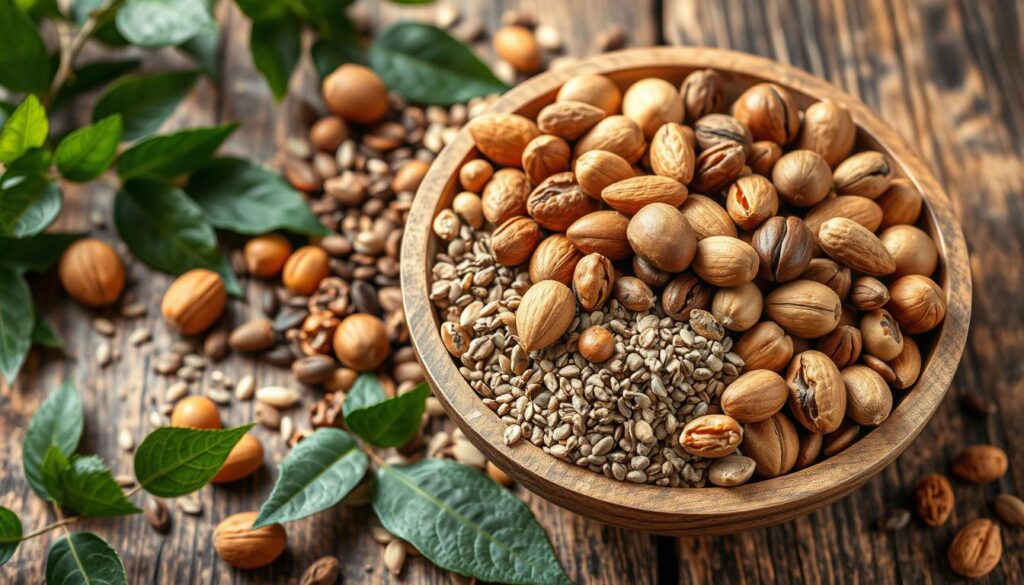
Avocado and Olive Oil: Mediterranean Fat Sources
Avocados and olive oil are key parts of the Mediterranean diet. They are full of healthy fats. These foods are packed with nutrients that help keep you healthy.
Health Benefits
Avocados are full of monounsaturated oleic acid, which fights inflammation. A 100g avocado has about 14.7g of fat and 160 calories. They also have fiber, lutein for your eyes, and potassium.
Olive oil is another fat source from the Mediterranean diet. It has a lot of monounsaturated fats. One tablespoon of olive oil has about 14g of fat. It also has vitamin E, vitamin K, and antioxidants. Eating olive oil can lower your heart disease risk.
Usage Guidelines
- Add avocado to salads, sandwiches, smoothies, and sauces.
- Use extra virgin olive oil for cooking, dressings, and marinades.
- Drizzle olive oil over roasted veggies or as a dip for fresh bread.
- Replace butter or other saturated fats with olive oil when baking.
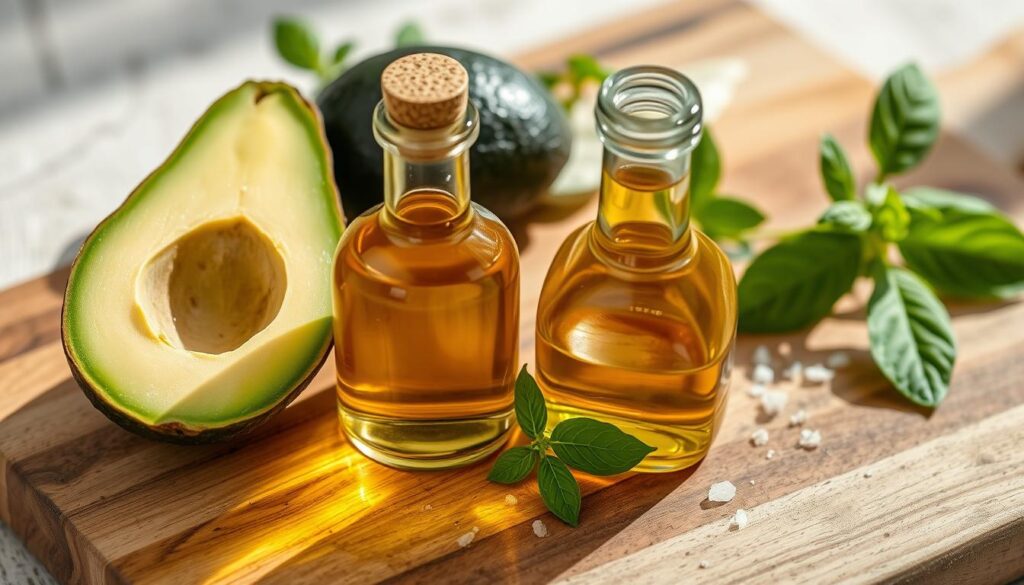
Adding these Mediterranean fats to your meals can boost your health. Enjoy the many benefits they offer for your well-being.
Dark Chocolate and Other Surprising Healthy Fat Sources
Dark chocolate is a tasty treat that’s also good for you. It has 70-85% cocoa and lots of healthy fats. A small piece, about 1 ounce, has 12.1g of fat and important nutrients like potassium and calcium.
It also has flavonoids that help your brain and heart. But, eat it in small amounts because it has a lot of sugar and fat.
There are other foods that are full of healthy fats too. Eggs are not just for protein; they also have choline. Choline is good for your liver, brain, and muscles. Full-fat yogurt is also great because it has probiotics that keep your gut healthy.
Healthy Fat-Rich Foods to Explore
- Dark Chocolate (70-85% cocoa) – Provides healthy fats, antioxidants, and essential nutrients.
- Eggs – Offer a mix of saturated and unsaturated fats, as well as choline for overall health.
- Full-Fat Yogurt – Contains probiotics that promote gut health and beneficial fats.
| Food | Fat Content (per serving) | Key Nutrients |
|---|---|---|
| Dark Chocolate (1 oz) | 12.1g | Potassium, Calcium, Magnesium, Antioxidants |
| Eggs (1 large) | 5g | Choline, Protein, Vitamins A, B, and E |
| Full-Fat Yogurt (1 cup) | 8g | Probiotics, Calcium, Protein |

Adding these foods to your diet can make it healthier and tastier. Just remember to eat them in small amounts for a balanced diet.
Incorporating Healthy Fats into Daily Meals
Adding healthy fats to your meals is simple. Just a few changes can make your meals more nutritious and tasty.
Breakfast Options
Begin your day with these healthy fat-rich breakfast ideas:
- Avocado toast: Top whole-grain bread with mashed avocado, olive oil, and a bit of salt and pepper.
- Nut butter on whole-grain bread: Spread almond or peanut butter on whole-grain toast.
- Eggs cooked in olive oil: Scramble, fry, or poach eggs with a tablespoon of olive oil.
Lunch and Dinner Ideas
Try these healthy fat-rich lunch and dinner options:
- Salad with olive oil vinaigrette: Dress your greens with olive oil, vinegar, and seasonings.
- Fatty fish: Bake, grill, or pan-sear salmon, tuna, sardines, or mackerel for omega-3s.
- Tofu stir-fry: Sauté tofu in avocado or sesame oil with lots of veggies.
Snacks like nuts, seeds, and nut butters are great for healthy fats. Use liquid oils like olive, avocado, or canola oil when cooking. These changes help you get more heart-healthy fats and support your health.
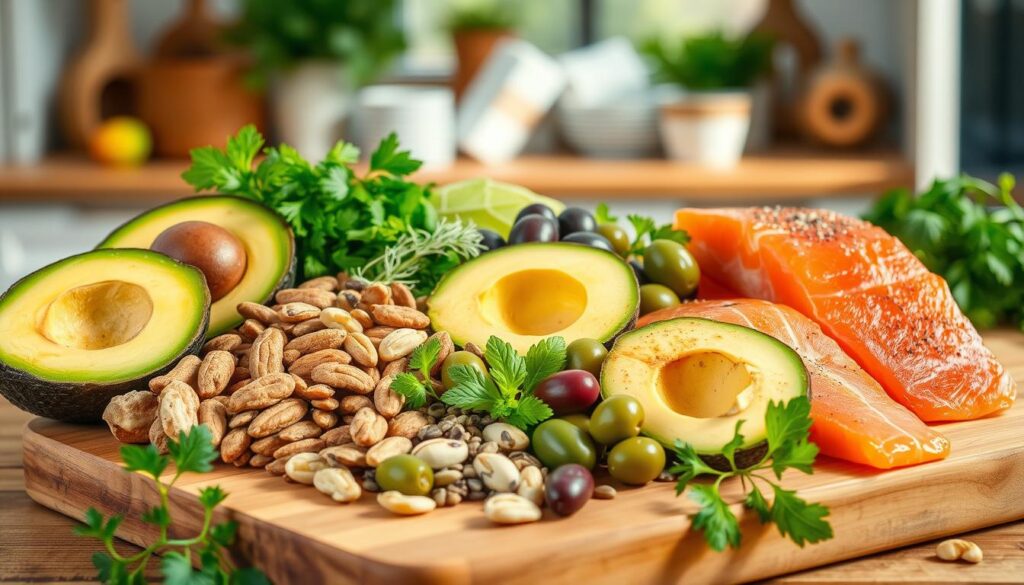
“Fats are an essential part of a balanced diet, and including the right kinds of healthy fats can have numerous benefits for your health.”
Trans Fats and Foods to Avoid
Trans fats are the worst kind of dietary fat. They increase bad LDL cholesterol and lower good HDL levels. This raises the risk of heart disease, stroke, and other serious health issues.
Natural trans fats are found in some meat and dairy. But, artificial trans fats in baked goods, snacks, margarine, and fried foods are the real danger. Some breakfast sandwiches have up to 6g of trans fat. Certain ice cream flavors have 0.5g per serving.
The FDA banned artificial trans fats in food products. This move aims to prevent thousands of heart attacks and deaths each year. Still, always check food labels for “partially hydrogenated oils” to spot trans fats.
- Baked goods, fried foods, and shortening are the most prominent sources of trans fats.
- High LDL cholesterol and low HDL cholesterol are risk factors for heart disease, the leading cause of death in the United States.
- Food manufacturers can list “zero grams” of trans fats if their product has less than 0.5g per serving, so it’s crucial to read labels thoroughly.
To stay healthy, choose plant-based meals and limit natural trans fats. Also, pick low trans fat toppings for desserts. By making smart choices and reading labels, you can protect your heart.

Balancing Fat Intake for Weight Management
Fats are calorie-dense but important for a balanced diet. They help with weight management. Healthy fats like nuts, seeds, and fatty fish make you feel full. This can help you eat less.
The American Heart Association says to limit saturated fats to 5-6% of your daily calories. For most adults, that’s about 13 grams a day. Replace saturated fats with healthy fats, not refined carbs.
It’s important to balance fats with protein and fiber for weight management. Eating foods high in protein, like eggs and lean meats, can help with weight loss. It also prevents diseases linked to obesity.
Eating foods like chili peppers, chia seeds, and ginger can boost your metabolism. They also make you feel full. To manage your weight, focus on whole foods and keep calorie intake in check.
| Food | Health Benefits for Weight Management |
|---|---|
| Eggs | Increase feelings of fullness for 4 hours compared to cereal and juice |
| Potatoes | Scored highest on the Satiety Index, promoting feelings of fullness |
| Nuts | Can promote weight loss and improve metabolic health |
| Whole Grains | Support healthy weight loss more effectively than refined grains |
| Chia Seeds | High in fiber and omega-3s, can increase feelings of fullness |
| Greek Yogurt | Full-fat variety with probiotics can improve gut function and weight management |
Eating a variety of healthy fats and controlling portions helps with weight management. You get the benefits of essential nutrients and healthy fats.
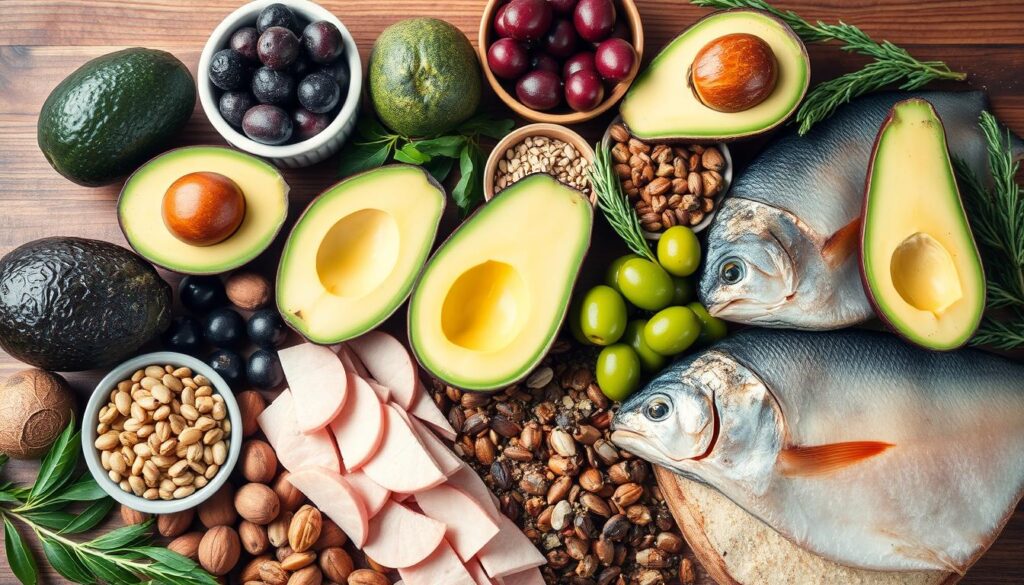
The Role of Fats in Brain and Heart Health
Fats are key for brain and heart health. Omega-3 fatty acids, especially DHA, are vital for brain function and growth. They may prevent cognitive decline and Alzheimer’s disease. They also help with depression and ADHD symptoms.
Monounsaturated and polyunsaturated fats are good for the heart. They lower bad LDL cholesterol and reduce inflammation. Eating fatty fish and using olive oil can lower heart disease risk.
- Mediterranean and DASH diets are good for brain health
- MIND diet combines Mediterranean and DASH to fight cognitive decline
- Fatty fish, nuts, seeds, berries, and dark chocolate are good for the brain
- Monounsaturated and polyunsaturated fats are good for the brain
- Avoiding trans and saturated fats can lower stroke and heart attack risk
The brain is about 60% fat by dry weight. This shows how important fats are for brain health. Omega-3 and omega-6 fatty acids are key, with a 5:1 ratio recommended.
“Lipids represent about 50% of the brain’s dry weight, emphasizing the impact of diet on cognitive processes, emotions, behavior, and synaptic plasticity.”
Eating healthy fats supports brain and heart health. It lowers risks of cognitive decline, Alzheimer’s, heart disease, and stroke.
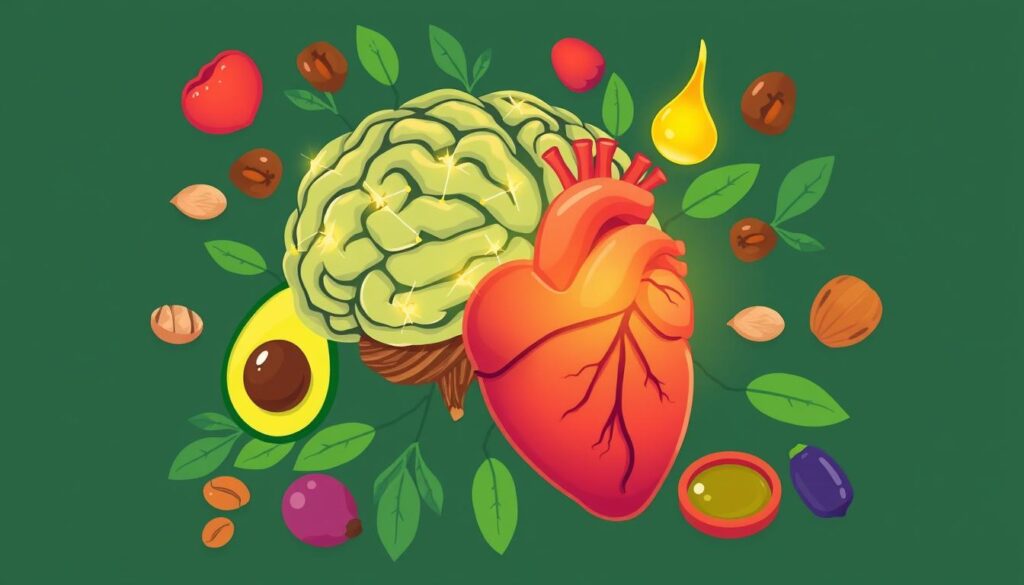
Conclusion
Adding healthy fats to your diet is key for good health. Choose monounsaturated and polyunsaturated fats from fatty fish, nuts, seeds, avocados, and olive oil. These fats help your heart, brain, and weight, and make nutrients easier to absorb.
It’s good to cut down on saturated and trans fats but don’t remove all fat. Instead, swap unhealthy fats for better ones and watch your portions. This smart choice can boost your nutrition and health.
The World Health Organization and Dietary Reference Intakes suggest 20-35% of calories should come from fat. The American Heart Association/American College of Cardiology say keep saturated fats below 5-6% of total energy. For those with diabetes, the American Diabetes Association has specific guidelines.
The American College of Cardiology/American Heart Association/The Obesity Society found that different diets can help with weight loss. This is true for overweight and obese adults, no matter the fat content.
FAQ
What are the different types of dietary fats?
There are several types of dietary fats. These include monounsaturated, polyunsaturated (like omega-3 and omega-6), saturated, and trans fats.
How do healthy fats impact body functions?
Healthy fats are vital for energy and vitamin absorption. They also help with heart health, brain function, and fighting inflammation.
What is the connection between fats and cholesterol?
Fat intake affects cholesterol levels. HDL is good cholesterol. But high LDL can cause artery blockages.
What are the differences between good fats and bad fats?
Good fats, like unsaturated fats, lower disease risk. Bad fats, like trans fats, increase heart disease and weight gain.
What are some of the best plant-based sources of healthy fats?
Healthy fats come from plants like avocados, olive oil, nuts, seeds, and nut butters.
What are the benefits of omega-3 fatty acids?
Omega-3s prevent depression, dementia, and heart disease. They fight inflammation. You can find them in fatty fish and chia seeds.
What are the heart health benefits of monounsaturated fats?
Monounsaturated fats from olive oil and avocados lower bad LDL cholesterol. They also raise good HDL cholesterol.
What are good sources of polyunsaturated fats?
Good sources of polyunsaturated fats include sunflower, sesame, and pumpkin seeds. Also, flaxseed, walnuts, and fatty fish are good.
What are the best types of fish for healthy omega-3s?
Salmon, mackerel, herring, and sardines are top choices for omega-3 fatty acids.
How can nuts and seeds contribute to a healthy diet?
Nuts and seeds are full of healthy fats, protein, fiber, vitamins, minerals, and antioxidants. They support heart health and weight management.
What are the benefits of including avocado and olive oil in the diet?
Avocados and olive oil are rich in heart-healthy monounsaturated fats. They also have anti-inflammatory properties.
What other surprising sources of healthy fats exist?
Dark chocolate, eggs, and full-fat dairy like yogurt are also good sources of healthy fats.
How can I incorporate more healthy fats into my daily meals?
Add avocado to toast, use nut butters, and cook with olive or canola oil. Include fatty fish, nuts, and seeds too.
What are the dangers of trans fats, and how can I avoid them?
Trans fats raise bad LDL cholesterol and lower good HDL cholesterol. They increase disease risk. Avoid them by reading food labels carefully.
How can I balance fat intake for healthy weight management?
Healthy fats help with weight control. But watch portion sizes. Replace unhealthy fats with unsaturated ones and keep calorie balance.
How do fats impact brain and heart health?
Omega-3s are key for brain function. Monounsaturated and polyunsaturated fats improve heart health and reduce disease risk.


